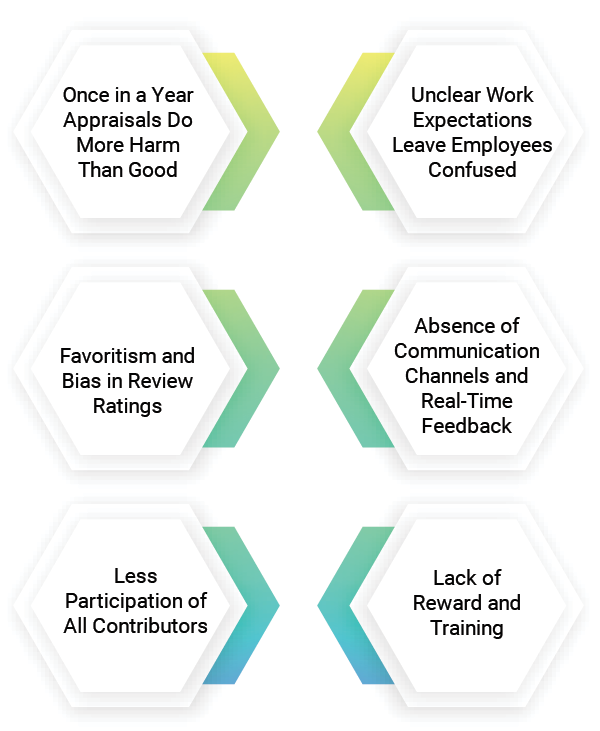This blog points out why performance appraisals fail. It also encourages you to use best HR practices to make evaluations more meaningful.
Annual performance assessments are carried out to evaluate yearly performance of employees. Through annual appraisals, managers evaluate employee performance and their overall contribution to the company.
A well-planned evaluation process allows managers to identify top, average and low performers. In the long run, this also helps in properly rewarding, training and mentoring employees accordingly.
Unfortunately, managers provide feedback only during appraisals. This happens once a year and it often causes stress to employees. As a result, employees feel dissatisfied and unhappy. In reality, it has been seen that employees do not get timely feedback or recognition for their hard work.
On the other hand, managers sometimes dislike performance evaluations and avoid it. Not only do they miss out on providing feedback from time to time, but also delay employee assessments. In that case, performance appraisals cause dissatisfaction among the subordinates and negatively impacts employee productivity. Thus, it is important to find out reasons why performance appraisals don’t work.
Managers often ask this question – What are the problems with performance appraisals?
Let’s try to find out. It happens that sometimes the existing performance review process is ineffective. Some managers, on the other hand, carry out appraisal meetings as one way conversation. The main problem arises when evaluation is not based on employee development, and is done only to give forced ranking.
Thus, the HR, managers and the leaders need to identify the weak points and inefficiencies in annual performance assessments. This should be the first thing to remember before looking for a solution.
So now the question arises – Do employees really feel engaged and motivated with annual performance appraisals? Surprisingly, the answer is Yes!
Employees feel excited for their performance evaluations only when the process is fair and focuses on their skill development.
Now, here is a list of the most common problems that lead to annual appraisals failure.
Why Performance Appraisals Fail? Explore What are the Problems with Performance Appraisals
There could be many reasons for appraisal failure. For example, untrained managers, inefficient performance appraisal software, lack of helpful feedback and more.
As a matter of fact, it is equally important to remember that employee evaluations are done not only to provide useful feedback. But also to develop better working relationships.
Firstly, let’s discuss the drawback and then we will look for a solution.

Once in a Year Appraisals Do More Harm Than Good
Employees do not feel satisfied with once in a year evaluations. They expect their managers to guide them from time to time.
Managers, on the other hand, do not have frequent performance conversations with their subordinates. Thus, employees remain unaware of missed deadlines and unachieved goals as a result.
Unclear Work Expectations Leave Employees Confused
In many companies, employee goals are not taken seriously for the most part. Whereas, setting clear work expectations for a balanced appraisal is an important step. However, many employers fail to put this into practice. They keep eyes only on key result areas and job responsibilities. This results in ineffective appraisal decision making.
Also, absence of positive, real-time feedback reduces the accuracy of the review process. This is a huge turn off particularly for millenials.
Favoritism and Bias in Review Ratings
According to research, two-thirds of performance management systems, regardless of forced rankings, misidentify top performers.
It is a fact that employees expect a fair review process at their workplace. The evaluations should be free from any bias by all means. Manager feedback needs to be based on performance reports or employee achievements.
Instead, multiple types of biases are found at the workplace. For instance, recency bias, leniency and severity bias, racial and gender bias, negativity bias and more.
Employees ultimately feel unhappy about bias, irregular feedback and personal opinions.
It must be remembered that managers should not pass personal opinions on employee behavior. Instead, they should evaluate employee work achievements. Otherwise, managers miss out on leaving a good impression on the team.
Absence of Communication Channels and Real-Time Feedback
Employees often complain that their managers do not openly discuss performance issues. In absence of communication, usually the appraisals tend to be ineffective. This is one of the major reasons why performance appraisals fail.
Employee dissatisfaction increases under these circumstances. Thus, it is equally important to give feedback and discuss employee productivity and quality of work.
Employees, on the other hand, are not able to find their career path due to lack of communication and manager feedback. Employee-manager relationships suffer as a result. Employees are unable to take the next step towards achieving their career goals. Thus, it causes harm to employees as well as the employer.
Less Participation of All Contributors
HR put in a lot of effort in planning and execution of the appraisal process. A very common reason why performance appraisals don’t work, is due to the non-participation of all contributors. As a matter of fact, annual performance appraisals are not as easy as they sound.
The process becomes more meaningful and fair when multiple stakeholders are involved. For instance, manager, HR, reviewer, employee and more.
After all, this should be a joint effort of everyone involved in the process. A non-collaborative method makes review ineffective and inaccurate.
Lack of Reward and Training
Old way of performance appraisals only encouraged top-to-bottom evaluation. Subordinate feedback and employee self-assessment are given less (or no) importance in such a situation. As a result, managers are unable to decide the performance of individuals. Besides, employees are never rewarded or coached during the review process.
Conduct appraisals at no cost
Conduct 360 feedback at no cost
* No credit card required
How to Make Performance Appraisals Effective?
A successful performance appraisal creates goals, lists employee achievements, prepares a development plan, engages employees among other things. Although planning and carrying out employee assessment is a tough task. However, it is not impossible.
It is advised to use reliable performance assessment software. In order to set goals, share feedback, measure day-to-day performance, identify scope of improvement and retain top talent. With an employee evaluation software, you can continuously monitor employee achievements as well as identify top performers. In addition, you can easily include all stakeholders in evaluation.
The use of online evaluation software allows for more accurate and timely decision making. It also helps to:
- Set clear work expectations for all employees.
- Give positive feedback regularly and help employees if they are having problems.
- Identify and reward top performers and keep them motivated.
- Provide training to employees and create skill development plans.
- Prepare potential leaders to create a succession pipeline.
- Lead a transparent review process. Let employees feel satisfied and complete their reviews without delay.
- Improve employee motivation and engagement by linking performance to pay.
Conclusion
There are many benefits of a systematic performance evaluation process. It is a formal practice carried out for all employees to analyze their contribution and performance. Though some companies make most of the evaluation process, whereas others fail to do so. They are unable to identify what are the problems with performance appraisals.
There could be several reasons why performance appraisals don’t work. However, with the right approach, performance evaluations can be both effective and rewarding for the employees.
Therefore, it is equally important for an employer to carry out reviews that are purposeful as well as employee-centric. Most importantly, you should hold performance conversation sessions frequently, and not just once in a year. Instead, use employee evaluations to improve employee development and increase engagement and retention.
If you have a lot of employee issues regarding annual performance appraisals, then make sure you use reliable appraisal software! Don’t just spend time wondering why performance appraisals fail. Before it’s too late, you should identify the weaknesses in your evaluation process and take action.
Frequently Asked Questions
| Q1. |
What are the steps in an effective performance evaluation? |
| Ans. | Steps in a fair and effective performance assessment vary depending upon the nature of work. Make sure you know why performance appraisals fail and don’t do those mistakes.
A simple approach can be used for the majority of white-collar employees:
Additionally, use an online performance assessment software to simplify the process and make most of it. |
| Q2. |
Does any employee evaluation software allow self appraisal ? Why performance appraisals fail without employee self evaluation? |
| Ans. | Employees feel sad when they have no say in their appraisal process. You will be easily able to include employees when using a performance evaluation software like Empxtrack.
Thus, employees can easily:
Employee self evaluation also motivates employees to work on themselves and achieve their objectives. In addition, this makes the entire process fair and more meaningful for employees. |
| Q3. |
How many times should I have a performance conversation with my subordinates in order to keep them motivated? What will be your suggestions for a first time manager? |
| Ans. | The first time manager is suggested to find out the needs of their team members. Talk to your subordinates as regularly as possible. Managers must ask about the problems faced by employees in achieving goals.
However, a manager should carry out performance conversation twice or thrice in a performance period. Real-time feedback is the most important thing. It helps employees to perform better and meet their goals in time. |








